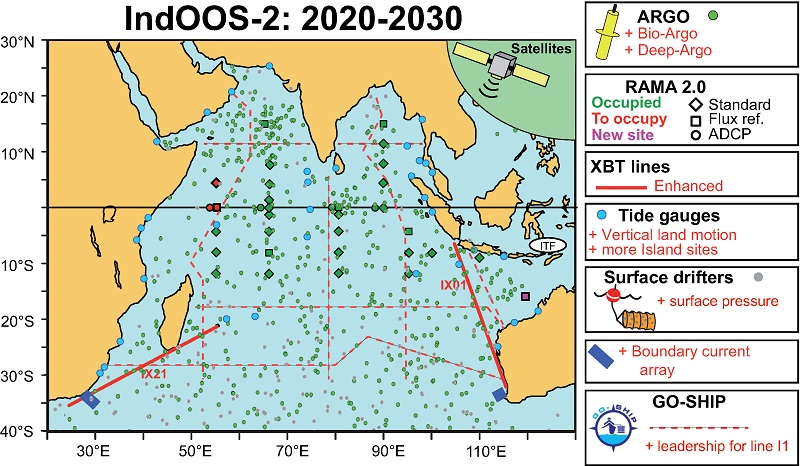IndOOS-2 Town Hall at 2020 Ocean Sciences Meeting

CLIVAR/IOC-GOOS Indian Ocean Region Panel (IORP) members organized a Town Hall at the AGU Ocean Sciences Meeting in San Diego. The Town Hall aimed to spread the word about the outcomes of a recent review of the Indian Ocean Observing System (IndOOS) that provides a roadmap to an improved observing network: IndOOS-2. The IndOOS-2 roadmap represents a four-year effort that was initiated at the 2016 Ocean Observations Panel for Climate (OOPC) meeting and involved more than 60 scientific experts. The Town Hall provided a forum to receive input from the community regarding (a) implementation of the IndOOS-2 roadmap and (b) improvement of end-user products and services, including models and predictions.
Lisa Beal and Roxy Mathew Koll provided an overview of the motivation, outcomes, and recommendations of the IndOOS-2 report that was published in late 2019. The IndOOS-2 roadmap presentations were followed by a lively discussion with the audience on how to overcome challenges to the implementation of the recommendations. Hurdles in extending IndOOS-2 efforts into the Exclusive Economic Zones (EEZ) around the Indian Ocean were raised as an issue in the discussion; the Argo program was pointed out as a success in that regard. Further interaction between IndOOS-2 with the Argo team was suggested with regards to strategy and advocacy. More in-depth interaction and coordination with the Global Ocean Observing System (GOOS) was also flagged as an appropriate conduit to facilitate IndOOS-2 goals. GOOS co-chair Toste Tanhua was in attendance and enquired about strategies for implementation and provided advice in this regard.
At the Town Hall, Caroline Ummenhofer gave further updates on upcoming presentations by the IORP members and other leading experts involved in drafting the IndOOS-2 roadmap to disseminate its findings to the community at conferences and meetings. Furthermore, an article summarizing the recommendations was submitted to the Bulletin of the American Meteorological Society and a CLIVAR Exchanges Special Issue: The Recent Decadal Review (2020-2030) of the Indian Ocean Observing System (IndOOS-2) and its Outcomes was just released for its February issue, guest edited by Lisan Yu. The Indian Ocean research community is encouraged to help spread the word to the broader community: i.e. to facilitate new ideas and partnerships among nations and institutions, as well as among observers, modelers, and developers of products and services in order to implement an IndOOS-2 that can meet future societal need for predictability of Indian Ocean climate and ecosystems across time scales from sub seasonal to decadal and beyond.











Add new comment